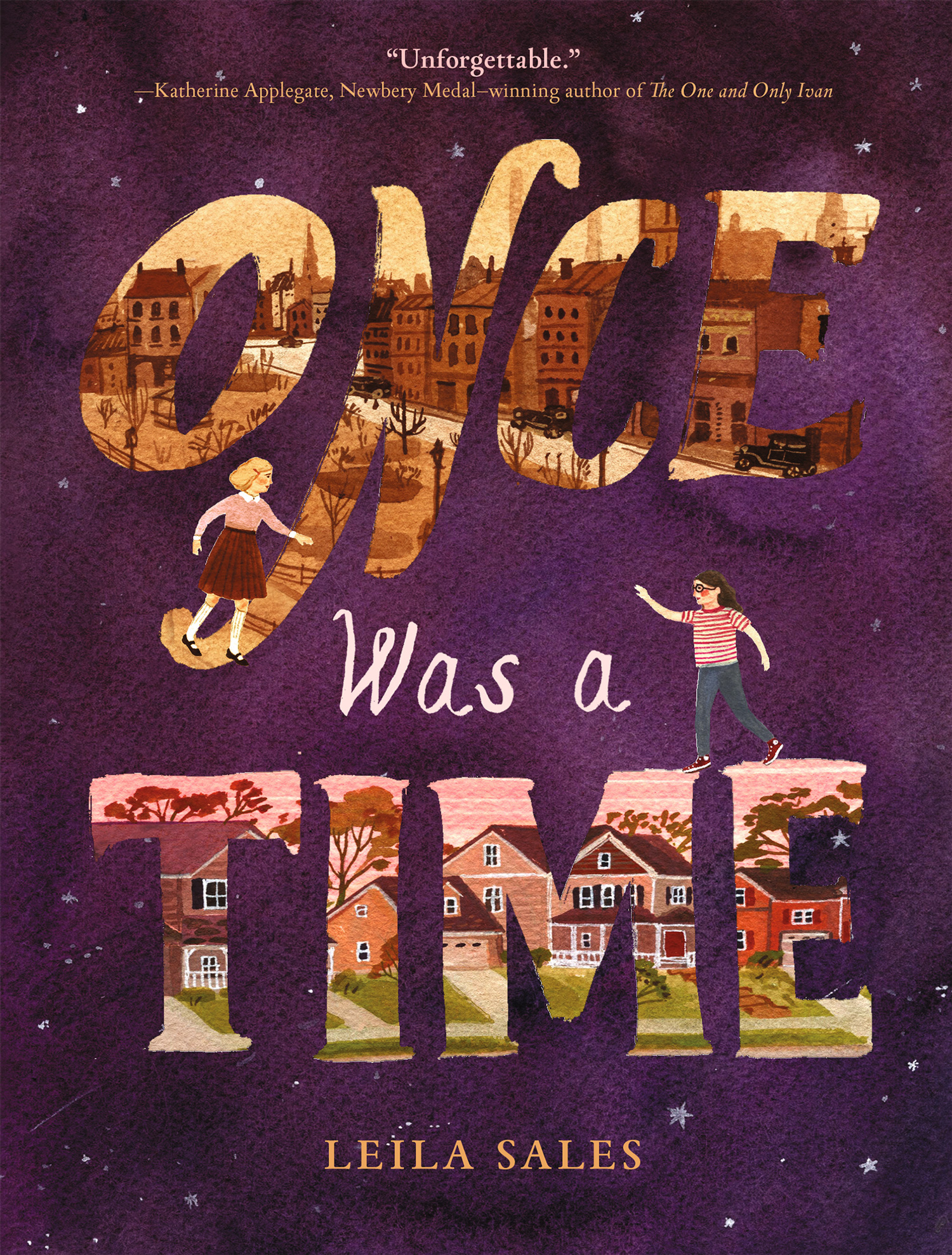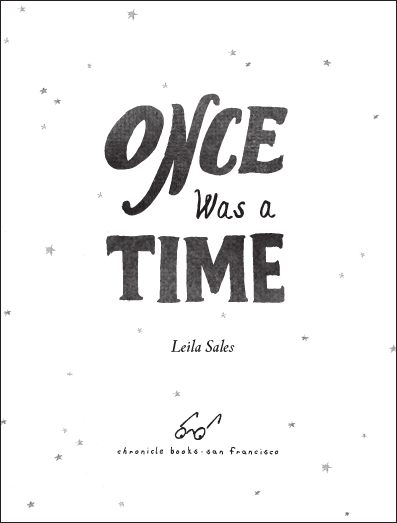Once Was a Time
Authors: Leila Sales


Table of Contents

Copyright © 2016
by Leila Sales.
All rights reserved. No part of this book may be reproduced in any form without written permission from the publisher.
Library of Congress Cataloging-in-Publication Data available.
ISBN 978-1-4521-4009-4 (Hardcover)
ISBN 978-1-4521-4377-4 (epub)
Chronicle Books LLC 680 Second Street San Francisco, CA 94107
Chronicle Booksâwe see things differently. Become part of our community at www.chroniclekids.com.
To Rebecca Serle:I would follow you across time and space.

Chapter 1
Most people don't believe in time travel, but that doesn't mean they're right.
Kitty and I knew better. My dad had been telling us about time travel for as long as we could remember. The question wasn't whether it worked. The question was how.
Kitty was my best friend. She was exactly three months older and exactly two inches taller than me. And while my thick, dark hair fell halfway down my back like a curtain, Kitty's was light and blond and bouncy, like an angel's. Our eyes were the same, thoughâthe sort of hazel that could look brown one day and green the next. Our eyes were so alike that they proved, we said,
that we could have been sisters.
Kitty didn't have any real brothers or sisters, so her parents watched her constantly. That's why she came to my house whenever she could: so she could get away from them. And that's how she came to know as much about time travel as I did.
We were both fascinated by the idea of it. “Tell us again,” we begged my dad over supper one Wednesday night. “Tell us again how it works.”
“You know this is secret information,” Dad warned us.
“We
know
that,” I said.
“We would never tell anyone, Mr. Bromley,” Kitty promised. “Even if they tortured us.”
My little brother, Thomas, looked up from the story paper he was reading under the table. The word “torture” had caught his attention. “Even if they won't let you sleep for days and days?” he asked.
“Even then,” Kitty said.
“Even if they stick needles in your eyeballs?” Thomas asked.
I shuddered.
“This is getting a bit too graphic for dinnertime,” Dad intervened.
Thomas shrugged and returned his attention to
The Hotspur
. Unless conversation was specifically about war, Thomas wasn't interested.
“So there are portals,” Dad said to me and Kitty, and we both leaned toward him, our Brussels sprouts forgotten on our plates. “They open up at random, and they exist only briefly. But if you step through a portal during the few seconds that it's open, you will be transported through time and space.”
“What do portals look like?” Kitty asked, her eyes wide. Dad had described them to us loads of times, but Kitty and I wouldn't be satisfied until we had a photograph. Maybe not even then.
“Well, like doorways,” Dad said, drawing one in the air with his hands. “Only shimmery and iridescent. They look like a ripply bit of air, if you can picture that.”
I could picture it. I completely could. I knew exactly what I thought a portal looked like. I just didn't know if I was right.
“You've never actually
seen
one, though, have you?” demanded Justine, my fifteen-year-old sister.
“No,” Dad acknowledged. “The vast majority of people will go their entire lives without ever seeing a portal. There just aren't that many portals, and they are so spread out across continents and centuries that the odds of encountering one are staggeringly small.”
“So basically you could be making it up,” Justine said.
Kitty and I glared at her.
“We don't have to see a portal to know that they're out there,” Dad said. “Just like we don't have to see a molecule to know that the world is full of them, or see a supernova to know that they happen. The science supports it, and personally I trust science more than whatever I happen to glimpse through my own flawed eyes.”
Kitty and I nodded our agreement, like scientists.
Justine
shrugged. “You've never even
met
a single person who's seen a portal,” she said.
“Certainly I have,” Dad objected. “You know this,
Justine.
I've told you all about the gentleman from
Edinburgh
who once found a portal in his parlor.”
My sister scoffed. “And why ever did you believe him? I don't.”
“Because,” Dad said, “I interviewed him in detail, and his description of the portal, his knowledge of its shape and tenorâit was too dead-on to be faked.”
“A coincidence,” Justine suggested.
I knew exactly how Dad would respond to that. I reckoned Justine knew, too, and was just egging Dad on. And he said, as I'd expected, “When something seems like an unbelievable coincidence, then consider that it might not
be
a coincidence.”
That was one of his favorite expressions.
“You're right to be dubious, Justine,” Dad went on. “All great scientists doubt. That's why we become scientists. These are all just theories. Time travel is a theory. Gravity is a theory. Evolution is a theory. I suppose they might someday prove to be incorrect, but until then, they're the best explanations we have for the world around us.”
“Super,” Justine muttered, and she went back to reading
her
story paper under the table.
Everyone in my family read during dinner, and pretty much all the rest of the time, too. I had
A Little Princess
in my lap, and as soon as Dad finished telling us about time travel, I was planning to reread (for the eleventh time) the scene where Sara makes Miss Minchin cross by being secretly fluent in French.
A Little Princess
is my favorite book. I took it out of the library six times in a row before I had saved up enough pocket money to buy my own copy.
“Mr. Bromley, what will you do if someday you
do
see a portal?” Kitty asked.
“I'll study it, of course,” Dad said.
“But would you go through it?” Kitty persisted.
I held my breath. I had never dared to ask him this question so directly, because I wasn't sure I could handle his answer. I wanted him to say no. I wanted him to say,
I would stay here with my family.
He didn't. But he didn't say yes, either. “What you must understand, Kittyâ”
“Catherine,” she interrupted. Justine snorted and noisily turned a magazine page.
Kitty's real name was Catherine. When we first became friends, we were just babies in prams, and I couldn't pronounce “Catherine” yet. So I called her “Kitty,” and it stuck. Now that we were ten, Kitty was worried that her nickname sounded too childish, so she wanted everyone to start calling her by her real name. “Plus,” she had pointed out a few weeks ago, “âCatherine' has lots of good anagrams. You can rearrange the letters to âNice Heart.' Or âThe Race In.' You can't make
any
other words out of the letters in âKitty.'”
Kitty liked words whose letters could be rearranged to form new words. The better a word anagrammed, the more she liked it. I'd given her a book about anagrams last Christmas, and already she seemed to be better at them than the book's author was. She kept finding ones that the book had missed.
She was right about her name, but I refused to start calling her Catherine anyway. There were two other Catherines in our form that year, but there was only one Kitty.
Dad went on answering her question. “What you must understand is that if you go through one of these portals, you have no idea where you're going to wind up. Or
when
you're going to wind up. You could find yourself in the twelfth century in the middle of the jungle. You could be transported to the center of the Atlantic Ocean in the year 2000. Wherever you go, odds are that it won't
be safe.”
“It isn't safe here, either,” I whispered.
“Oh, we're perfectly safe, Lottie,” Dad said.
And maybe he was rightâmy dad was usually rightâbut I didn't
feel
safe.
The war had been raging for more than a year now, and already I could hardly remember what life was like during peacetime. France had fallen to Hitler over the summer, and every day I worried that England would be next. On the wireless, Prime Minister Churchill said that we would never surrenderâbut how could he know that? The Luftwaffeâthe German Air Forceâseemed to be dropping bombs on London more nights than not. And even though we lived more than a hundred miles from London, the Luftwaffe had targeted Bristol, too. A few girls at my school had moved to the countryside for the duration; Alice Fitzhugh's parents had sent her all the way to Canada. Part of me wished I could escape with them, even though my dad said their families were being ridiculous.
Maybe the jungle in the year 1150 would be more dangerous. But then again, maybe it wouldn't be.
“The bigger problem with time traveling,” Dad went on, “is not that you don't know where or when in time the portal will take you. The bigger problem is that you would
never
be able to find your way back home. The odds are infinitesimally small that you would see even one portal in your life, so the odds that you would then see
another
one are essentially impossible. And even if somehow, defying all odds, you did see a second portal, and you walked through itâwell, it wouldn't take you home. It would take you to yet some other place and some other time.”
Even Thomas and Justine were listening by now, though they were acting like they weren't. I could tell because they had stopped turning pages.
“So if you are ever given the opportunity to go through a portal,” Dad said, “you had better be absolutely certain that you can handle never coming back.”
I wondered what I would do if I somehow saw one, one day. I thought I would show it to my dad and let him decide what to do about it. I wouldn't go through it, I knew that. Certainly, my life in this time and place wasn't perfect.
Hitler
could conquer England any day, all my favorite foods were rationed, my sister made me cry on average once a week, and my teacher hated me because I was always reading under my desk during lessons.
No, my life wasn't perfect. But I wouldn't want to leave it behind forever. I liked my adventures to stay where they belonged: in books, where I could shut the cover on them any time I wanted.
“I would do it,” Kitty announced, her eyes bright. “If I ever see a portal, I'll go.”
“You're sure about that?” Dad asked with a smile.
Kitty nodded firmly. “It's like an unopened letter, isn't it? Even if you think there's bad news inside of it, how could you
not
be curious enough to open it?”
“What about me?” I demanded.
“What do you mean?” Kitty asked, her forehead crinkling.
“You'd go through a portal and never see me again?”
“Of course not, Lottie,” Kitty said. “I would never, ever leave you. If I go through a portal someday, I'm taking you with me.”
